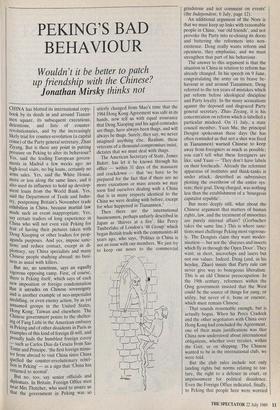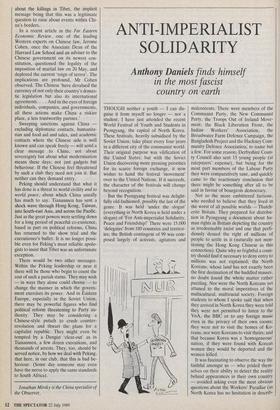PEKING'S BAD BEHAVIOUR
Wouldn't it be better to patch up friendship with the Chinese?
Jonathan Mirsky thinks not CHINA has blotted its international copy- book by its deeds in and around Tianan- men square, its subsequent executions, detentions, and lists of counter- revolutionaries, and by the increasingly likely trial for counter-revolution (a capital crime) of the Party general secretary, Zhao Ziyang. But is there any point in putting pressure on Peking to alter its behaviour? Yes, said the leading European govern- ments in Madrid a few weeks ago: no high-level visits, no big loans, certainly no arms sales. Yes, said the White House, more or less along the same lines, and it also used its influence to hold up develop- ment loans from the World Bank. Yes, said the Department of Trade and Indus- try, postponing Britain's November trade exhibition in China, because martial law made such an event inappropriate. Yes, say certain traders of long experience in China who will not even visit Peking for fear of having their pictures taken with Deng Xiaoping or other leaders for prop- aganda purposes. And yes, impose sanc- tion5 'and reduce contact, except in di- plomacy, say China specialists and many Chinese people studying abroad: no busi- ness as usual with killers.. But no, no sanctions, says an equally vigorous opposing camp. First, of course, there is Peking itself, which says of each new imposition or foreign condemnation that it intrudes on Chinese sovereignty and is another example of neo-imperialist Meddling, or even enemy action, by as yet unnamed groups in the United States, Hong. Kong, Taiwan and elsewhere. The Chinese government points to the shelter- ing of Fang Lizhi in the American embassy in Peking and of other dissidents in Paris as
examples of this kind of foreign and proudly hails the humblest foreign envoy — such as Carlos Dias da Gracia from Sao Tome and Principe, 'the first foreign minis- ter from abroad to visit China since China quelled the counter-revolutionary rebel- lion in Peking' — as a sign that 'China has returned to normal'.
But no, too, say senior officials and diplomats. In Britain, Foreign Office men near Mrs Thatcher, who 'used to assure us that the government in Peking was so utterly changed from Mao's time that the 1984 Hong Kong Agreement was safe in its hands, now tell us with equal assurance that Deng Xiaoping and his aged comrades are thugs, have always been thugs, and will always be thugs. Surely, they say, we never imagined anything else. Realism, these veterans of a thousand compromises insist, dictates that we must deal with thugs.
The American Secretary of State, James Baker, has let it be known through his office — within 31 days of the massacre and crackdown — that 'we have to be prepared for the fact that if there are no more executions or mass arrests we may soon find ourselves dealing with a China that is in many respects identical to the China we were dealing with before, except for what happened in Tiananmen.' Then there are the international businessmen, perhaps unfairly described in Japan as 'thieves at a fire', like Percy Timberlake of London's '48 Group' which began British trade with the communists 40 years ago, who says, 'Politics in China is not an issue with our members. We just try to keep our noses to the commercial
grindstone and not comment on events' (the Independent, 6 July, page 12).
An additional argument of the Noes is that we must keep up links with reasonable people in China, 'our old friends', and not provoke the Party into re-closing its doors and battering the reformers into non- existence. Deng really wants reform and openness, they emphasise, and we must strengthen that part of his behaviour.
The answer to this argument is that the situation in China in relation to reform has already changed. In his speech on 9 June, congratulating the army on its brave be- haviour in and around Tiananmen, Deng referred to the ten years of mistakes which put reform before ideological discipline and Party loyalty. In the many accusations against the deposed and disgraced Party general secretary, Zhao Ziyang, it is his concentration on reform which is labelled a particular misdeed. On 11 July, a state council member, Yuan Mu, the principal Dengist spokesman these days (he has often reminded us that not a shot was fired in Tiananmen) warned. Chinese to keep away from foreigners as much as possible; you can't tell what these foreigners are like, said Yuan — 'They don't have labels on their foreheads.' Already the reformist apparatus of institutes and think-tanks is under attack, described as subversives plotting the overthrow of the entire sys- tem; their goal, Deng charged, was nothing less than the establishment of a 'bourgeois capitalist republic'.
But more deeply still, what about the Chinese argument that matters of human rights, law, and the treatment of minorities are purely internal affairs? (Gorbachev takes the same line.) This is where sanc- tions must challenge Peking most vigorous- ly. The Dengists claim they want moder- nisation — but not the 'diseases and insects which fly in through the Open Door'. They want, in short, microchips and lasers but not our values. Indeed, Deng (and, in his heyday, Zhao) insists that Party rule can never give way to bourgeous liberalism. This is an old Chinese preoccupation. In the 19th century, reformers within the Qing government insisted that the West could be the source of things for yung, or utility, but never of ti, bone or essence, which must remain Chinese.
That sounds reasonable enough, but is actually bogus. When Sir Percy Cradock and the other negotiators with China over Hong Kong had concluded the Agreement, one of their main justifications was that China now understood about international obligations, whether over treaties, within the Gatt, or on shipping. The Chinese wanted to be in the international club, we were told.
But the club rules include not only landing rights but norms relating to tor- ture, the right to a defence in court, or imprisonment for political dissidence. Even the Foreign Office indicated, finally, to Peking that people here were worried about the killings in Tibet, the implicit message being that this was a legitimate question to raise about events within Chi- na's borders.
In a recent article in the Far Eastern Economic Review, one of the leading Western experts on Chinese law, Jerome Cohen, once the Associate Dean of the Harvard Law School and an adviser to the Chinese government on its newest con- stitution, questioned the legality of the imposition of martial law on 20 May, and deplored the current 'reign of terror'. The implications are profound, Mr Cohen observed. The Chinese 'have devalued the currency of not only their country's domes- tic legislation but also its international agreements. . . . And in the eyes of foreign individuals, companies, and governments, all these actions make China a riskier place, a less trustworthy partner.'
Sweeping sanctions against China excluding diplomatic contacts, humanita- rian and food aid and sales, and academic contacts where the Chinese side is well known and can speak freely — will send a clear message to China, not about sovereignty but about what modernisation means these days: not just gadgets but behaviour. If the Chinese feel threatened by such a club they need not join it. But neither can they demand entry.
Peking should understand that what it has done is a threat to world civility and to world peace, about which China usually has much to say. Tiananmen has sent a shock wave through Hong Kong, Taiwan, into South-east Asia, and across the Pacific. Just as the great powers were settling down for a long period of peaceful co-existence, based in part on political reforms, China has returned to the show trial and the executioner's bullet. It is no longer possi- ble even for Peking's most reliable apolo- gists to insist that Tibet was an unfortunate exception.
There would be two other messages. Within the Peking leadership or near it there will be those who begin to count the cost of such a pariah status. They may wish — in ways they alone could choose — to change the manner in which the govern- ment exercises its power. And in Eastern Europe, especially in the Soviet Union, there may be powerful figures who find political reform threatening to Party au- thority. They may be considering a Chinese-style putsch to crush counter- revolution and thwart the plans for a capitalist republic. They might even be tempted by a Dengist 'clear-out' as in Tiananmen, a few dozen executions, and thousands of arrests. They, too, should be served notice, by how we deal with Peking, that here, in our club, that this is bad be- haviour. (Some day someone may even have the nerve to apply the same standards to South Africa).
Jonathan Mirsky is the China specialist of the Observer.



















































 Previous page
Previous page